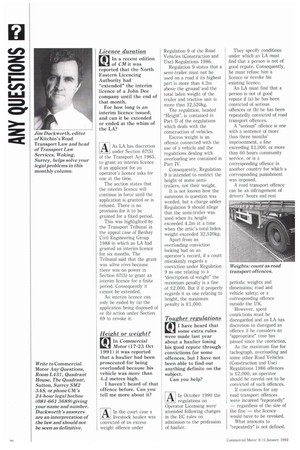Height or weight?
Page 32

If you've noticed an error in this article please click here to report it so we can fix it.
In Commercial Motor (17-23 Oct 1991) it was reported that a haulier had been prosecuted for being overloaded because his vehicle was more than 4.2 metres high.
I haven't heard of that offence before. Can you tell me more about it?
A In the court case a livestock haulier was convicted of an excess weight offence under
Regulation 9 of the Road Vehicles (Construction and Use) Regulations 1986.
Regulation 9 states that a semi-trailer must not be used on a road if its highest part is more than 4.2m above the ground'and the total laden weight of the trailer and tractive unit is more than 32,520kg.
The regulation, headed "Height", is contained in Part II of the regulations which deals with the construction of vehicles.
Excess weight is an offence connected with the use of a vehicle and the regulations dealing with overloading are contained in Part IV.
Consequently, Regulation 9 is intended to restrict the height of some semitrailers, not their weight.
It is not known how the summons in question was worded, but a charge under Regulation 9 should allege that the semi-trailer was used when its height exceeded 4.2m at a time when the artic's total laden weight exceeded 32,520kg.
Apart from an overloading conviction looking bad on an operator's record, if a court mistakenly regards a conviction under Regulation 9 as one relating to a "description of weight" the maximum penalty is a fine of £2,000. But if it properly regards it as one relating to height, the maximum penalty is £1,000,
































































